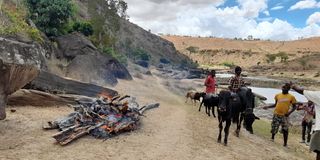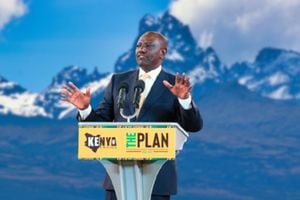Mwache dam to end water woes in Mombasa, Kwale

Herders at the site where the Mwache Dam will be constructed in Fulugani area in Kinango, Kwale County.
Mombasa and Kwale counties are banking on the Sh20 billion World Bank-funded Mwache multipurpose dam project to address water shortages.
Work on the dam will kick off in a few weeks as the land compensation process has been completed.
Mombasa, one of Kenya’s tourism hubs, lacks a freshwater source. The county depends on water from the neighbouring counties of Kilifi, Kwale and Taita Taveta.
Mombasa gets an accumulated average of 30,000 cubic metres against a demand of 200,000 cubic metres from the three counties, according to statistics from the county government.
A World Bank technical team led by Dr Pieter Waalewijn has met governors Abdulswamad Nassir (Mombasa) and Fatuma Achani (Kwale) to discuss the project.
“I received a briefing from the World Bank technical team on this project as we work through the Mombasa Water and Sewerage
Company to fulfill our promise of water for all in Mombasa,” Governor Nassir said.
“This project is part of the second phase of the water security and climate resilience programme which will focus on Mombasa county.”
Mr Nassir said an 87.5-metre-tall concrete gravity dyke will boost water supply to Kwale and Mombasa counties.
“This is by supplying 186,000 cubic metres of water to the two counties daily and putting 2,600 hectares of land under irrigation,” he added.
Last week, Ms Achani met officials from the World Bank and the Ministry of Water. The governor said the officials assured her that locals would get jobs in the project for the next two years.
The project required 1,600 acres, displacing more than 4,000 residents.
“The team should ensure that proper arrangements are made to ensure Kwale locals are given priority in getting the water and employment opportunities coming along with the project,” said Ms Achani.
Her deputy Chirema Kombo said residents should be fully involved in the project.
The project was delayed for almost six years after the financing agreement was signed due to compensation disputes between Kwale leaders and the national government.
The compensation varied, with some locals getting Sh400,000 and others Sh500,000 per acre of land. But the leaders wanted residents to bag at least Sh1,000,000 per acre.
The project in Kasemeni ward, Kinango sub-county, was set to be completed in the 2025/2026 financial year.




